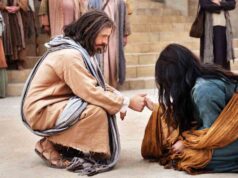First, second and third
By Pr Isaiah White
In The Seven Last Sayings of Jesus at the Cross, Dr Edward Tamale-Sali writes: “The final words of a dying person are so memorable and priceless to the living relatives of the late.”
Jesus was not killed by a mob, but through legal means by established institutions.
So, He was not speaking out of helplessness like the other murderer who asked to be remembered.
He did not need help, He was the help up there. Jesus never spoke from the bitterness of the heart, the wrongness of the mind and with the accusatory language like the murderer on the left side of His Cross.
Jesus was in charge of the whole situation. It is in this perspective that we must hold the seven last sayings of Jesus Christ.
These were not words of a dying man (as this may attract many connotations and stereotypes), but God hanging on the Cross to save His creation.
These were words of God the creator to His creatures and these were words of God the redeemer to those who are redeemed and whoever wishes to be.”
Let us look at each last saying briefly:
“Father forgive them; for they know not what they do” – Luke 23:34
In His dying moment, Jesus Christ had nothing but forgiveness on His mind.
He was hanged with His hands stretched and nailed on the Cross, His ribs were stretched from His legs and His feet were nailed on the Cross.
All these people and scenarios went through His mind and when he opened His mouth to speak, He said: “Father, forgive them for they do not know what they do.”
Up to His final hours on Earth, Jesus preached forgiveness. He taught forgiveness in the Lord’s Prayer: “Forgive us our trespasses, as we forgive those who trespass against us” (Matthew 6:12).
When asked by Peter how many times should we forgive someone, Jesus said seventy times seven (Matthew 18:21-22).
This Easter we are all called to forgive and ask for forgiveness as well.
“Verily I say unto thee, today shalt thou be with me in paradise” – Luke 23:43
While the forgiveness of God is overwhelming and mind-boggling, the gracious decisions and acts of God are shocking.
At the Cross, Jesus awarded a robber free ticket to Heaven. This is nothing, but being saved by grace. This robber got to Heaven before any other existing Christian then.
He was received in Heaven instantly and was to be with Jesus Christ that very night.
We must appreciate God’s grace now lest we risk being painfully saved, like the thief at the cross.
God is gracious and we cannot take this for granted for various reasons: Man is mortal and not immortal.
A man knows that he will die, but does not know how or when he will die.
Man, therefore, cannot assume to be saved at his point of death since he does not know when and how he will die.
The thief was blessed enough to be saved by God’s grace at his point of death, and many of us might not have that chance in life.
But as for the living, the grace of God has manifested itself to all of us and it is upon us to individually choose it, appreciate it and take it on for our salvation or neglect, despise and deflect it for our destruction.
It is amazing to know that there is a God who is willing to save us by His grace.
“Woman, behold thy son! … behold thy mother!”- John 19:26-27
Jesus provides for His mother in His dying moments. He did not leave her a will, but a working solution to all would be problems to her life.
He saw her standing by and knew her cares and grief, and saw John standing not far off.
So, He established a new relationship between His beloved mother and His beloved disciple.
Unlike in our world and its norms, in the Kingdom of God, real relationships and family ties are founded on one fundamental aspect; belief.
It is the beliefs of an individual that makes him your mother, brother, sister or father.
In the kingdom of darkness, people relate due to colour, country boundaries, ethnicity, profession, etc.
However, we learn in this third last word of Jesus at the Cross that in the Kingdom of God, relationships are bound to the element of belief.
Now you know why Christians address each other as ‘Brethren’.






















